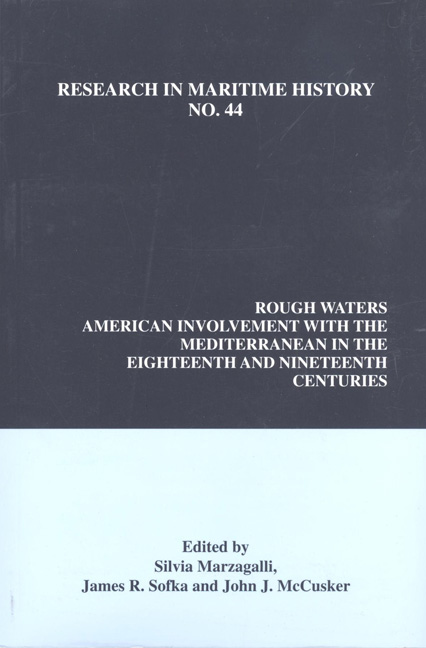Book contents
- Frontmatter
- Contents
- About the Editors
- Contributors' Notes
- “Rough Waters: American Involvement in the Mediterranean in the Eighteenth and Nineteenth Centuries: An Introduction”
- “Worth a War? The Importance of the Trade between British America and the Mediterranean”
- “Relations between North America and the Italian Peninsula, 1763-1799: Tuscany, Genoa and Naples”
- “American Shipping into the Mediterranean during the French Wars: A First Approach”
- “Notes toward a Franco-American Mediterranean 'From Below'”
- “Consuls and Consiglieri: United States Relations with the Italian States, 1790-1815”
- “Old and New Republics: Diplomatic Relations between the Republic of Genoa and the United States of America”
- ‘“From the Halls of Montesuma, to the Shores of Tripoli:’ Antoine Zuchet and the First Barbary War, 1801-1805”
- “Minorca: The First United States Naval Base in the Mediterranean and the American Consulate at Port Mahon”
- “‘The Jeffersonian Idea of National Security’ Revisited”
- “The Reluctant Warrior: Thomas Jefferson and the Tripolitan War, 1801-1805”
- “Slavery as Social Mobility? Western Slaves in Late Eighteenth Century Algiers”
- “Americans in the Mediterranean in the Late Eighteenth and Early Nineteenth Centuries: Concluding Remarks”
“Slavery as Social Mobility? Western Slaves in Late Eighteenth Century Algiers”
- Frontmatter
- Contents
- About the Editors
- Contributors' Notes
- “Rough Waters: American Involvement in the Mediterranean in the Eighteenth and Nineteenth Centuries: An Introduction”
- “Worth a War? The Importance of the Trade between British America and the Mediterranean”
- “Relations between North America and the Italian Peninsula, 1763-1799: Tuscany, Genoa and Naples”
- “American Shipping into the Mediterranean during the French Wars: A First Approach”
- “Notes toward a Franco-American Mediterranean 'From Below'”
- “Consuls and Consiglieri: United States Relations with the Italian States, 1790-1815”
- “Old and New Republics: Diplomatic Relations between the Republic of Genoa and the United States of America”
- ‘“From the Halls of Montesuma, to the Shores of Tripoli:’ Antoine Zuchet and the First Barbary War, 1801-1805”
- “Minorca: The First United States Naval Base in the Mediterranean and the American Consulate at Port Mahon”
- “‘The Jeffersonian Idea of National Security’ Revisited”
- “The Reluctant Warrior: Thomas Jefferson and the Tripolitan War, 1801-1805”
- “Slavery as Social Mobility? Western Slaves in Late Eighteenth Century Algiers”
- “Americans in the Mediterranean in the Late Eighteenth and Early Nineteenth Centuries: Concluding Remarks”
Summary
In 1785, Algerian corsairs seized their first American victims when they captured Maria of Boston and Dauphin of Philadelphia, both off the Portuguese coast. Taken back to Algiers, the twenty-one crew members were thrown into Algerian prisons (bagnios) where they were held with hundreds of other European, or Western, slaves. Eventually other Americans joined them in Algiers. The Algerian bagnios would hold 130 American men between 1785 and 1796.
In Algiers, the twenty-one American men joined a cosmopolitan, urban population with whom they interacted regularly. They communicated freely with one another and with Western consuls and merchants, and they sent and received mail and newspapers. Some American slaves used their autonomy to forge and foster connections with American and European diplomats, statesmen and businessmen, while others did so with Algerian leaders. Once free, they drew on these networks and their uncommon body of knowledge about North Africa to gain diplomatic positions beyond the reach of most sailors. Two enslaved Americans, Captain Richard O'Brien and Seaman James L. Cathcart, both captured in 1785, parlayed their Algerian enslavement into American diplomatic posts. They positioned themselves for consular positions by adopting strategies that were determined largely by their class and rank prior to capture. Captain O'Brien maintained and expanded networks outside of Algiers, while Cathcart created connections largely inside.
Since the thirteenth century, Barbary corsairs had terrorized Europeans by swooping down on towns and ships, enslaving thousands. Corsairs carried their European captives, including some American colonists, to North African urban centres where they were forcibly employed until – or if – they were ransomed. Over these centuries, Europeans and North Africans devised a negotiation system that facilitated ransoming their respective countrymen out of slavery. A few European countries even made diplomatic arrangements, usually requiring the payment of tribute, to prevent their countrymen's enslavement.
When they ventured into the Mediterranean, newly independent Americans were outside of these long established systems for avoiding corsair capture or for freeing captured men. They lacked North African connections and diplomats who knew local languages and customs. The fledgling United States Navy could not protect its merchant marine, and in the 1780s Americans did not possess the means to supplement this small force. Worse still, they could not afford to pay tribute to North Africans to protect their mariners or to ransom their captured men.
- Type
- Chapter
- Information
- Rough WatersAmerican Involvement with the Mediterranean in the Eighteenth and Nineteenth Centuries, pp. 207 - 220Publisher: Liverpool University PressPrint publication year: 2010

